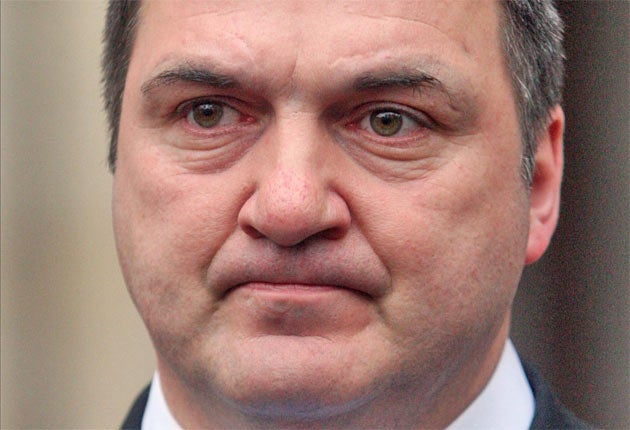Court gives Barry George hope of compensation

Your support helps us to tell the story
From reproductive rights to climate change to Big Tech, The Independent is on the ground when the story is developing. Whether it's investigating the financials of Elon Musk's pro-Trump PAC or producing our latest documentary, 'The A Word', which shines a light on the American women fighting for reproductive rights, we know how important it is to parse out the facts from the messaging.
At such a critical moment in US history, we need reporters on the ground. Your donation allows us to keep sending journalists to speak to both sides of the story.
The Independent is trusted by Americans across the entire political spectrum. And unlike many other quality news outlets, we choose not to lock Americans out of our reporting and analysis with paywalls. We believe quality journalism should be available to everyone, paid for by those who can afford it.
Your support makes all the difference.Two Irish Republicans have been told by the Supreme Court that they are entitled to compensation for the years they spent in prison after being wrongly convicted of murder. The ruling creates a new legal definition of "miscarriage of justice", which could lead to others who have had their convictions quashed receiving large payouts.
One case is that of Barry George, who spent eight years in prison after being convicted of the murder of the TV presenter Jill Dando. He was cleared after a retrial in 2008, but his claim for £1.4m for lost earnings and wrongful imprisonment was rejected last month by the Ministry of Justice.
Yesterday's Supreme Court judgment, by a majority verdict of five to four, means some claimants will be entitled to compensation even if they are unable to "prove their innocence beyond reasonable doubt" if a new fact has undermined the evidence against them to the extent that "no conviction could possibly be based upon the evidence of their cases". The Ministry of Justice emphasised that the new definition would apply in only a small number of cases.
While the judges allowed an appeal by Raymond McCartney and Eamonn MacDermott, who were wrongly accused of murdering a Royal Ulster Constabulary officer, they rejected an appeal by Andrew Adams, from Newcastle upon Tyne, whose conviction for murder was overturned after he had spent 14 years in jail.
Mr McCartney and Mr MacDermott were convicted of killing PC Patrick McNulty in Derry, in 1977. Mr McCartney, who was also convicted of another murder, became the IRA commander within the Maze prison and spent 53 days on hunger strike. He is now a Sinn Fein member of the Northern Ireland Assembly. "I feel totally vindicated," he said. "This is damning indictment of the RUC's interrogation techniques at the time and a damning indictment of the actions of the Public Prosecution Service at the time."
Mr MacDermott, a journalist, spent 15 years in prison. Both men's convictions were overturned in 2007, but were denied compensation at a court hearing a year later.
Mr Adams, a former aircraft engineer, was convicted in 1993 of the revenge shooting of a retired teacher, Jack Royal. Mr Royal had fatally stabbed David Thompson, but was acquitted on the grounds of self-defence. Mr Thompson's sister was Mr Adams's girlfriend. His conviction was overturned in 2007, but yesterday the nine judges decided unanimously he was not entitled to compensation on the grounds that a new jury "might or might not" have convicted him after hearing the fresh evidence. Lord Phillips said: "The quashing of a conviction does not of itself prove that the person whose conviction has been quashed did not commit the crime of which he was convicted. Thus it is not satisfactory to make the mere quashing of a conviction the trigger for payment of compensation."
Eric Metcalfe, from the pressure group Justice, said: "Not every wrongly convicted person who deserves compensation will benefit from today's ruling, but at least the innocent will not have to prove their innocence in order to be eligible."
Join our commenting forum
Join thought-provoking conversations, follow other Independent readers and see their replies
Comments